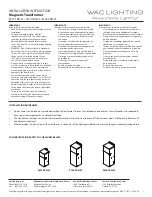
27
• If you are using an E type transceiver, when operating on the 430 MHz band, the
offset direction changes as follows:
Simplex operation >> + >> – >> = (–7.6 MHz) >> Simplex operation
If the offset transmit frequency falls outside the allowable range, transmitting
is inhibited. Use one of the following methods to bring the transmit frequency
within the band limits:
• Move the receive frequency further inside the band.
• Change the offset direction.
Note: While using an odd-split memory channel or transmitting, you cannot change the offset
direction.
n
Selecting an Offset Frequency
The offset frequency is the value which the transmit frequency will be offset
from the receive frequency. The default offset frequency on the 144 MHz
band is 600 kHz for all type versions. The default on the 430/440 MHz band is
5 MHz.
1 Select your desired band (A or B).
2 Enter Menu mode and access Menu 400 (OFFSET) {page 20}.
3 Set the appropriate offset frequency value.
• The selectable range is from 00.00 MHz to 29.95 MHz, in steps of 50 kHz.
Note: After changing the offset frequency, the new offset frequency will also be used by
Automatic Repeater Offset {page 29}.
n
Activating the Tone Function
To turn the Tone function on:
1 Select your desired band (A or B).
2 Press [TONE] to turn the Tone function ON.
• Each time you press
[TONE], the selection changes as follows:
None >> T (Tone) >> CT (CTCSS) >> DCS (DCS) >> None
• The icon appears on the display when the tone function is ON.
Note: When accessing a repeater that requires a 1750 Hz tone, you do not need to activate
the Tone function. Simply press the key assigned to the 1750 Hz tone {page 66} to transmit
the tone.
















































